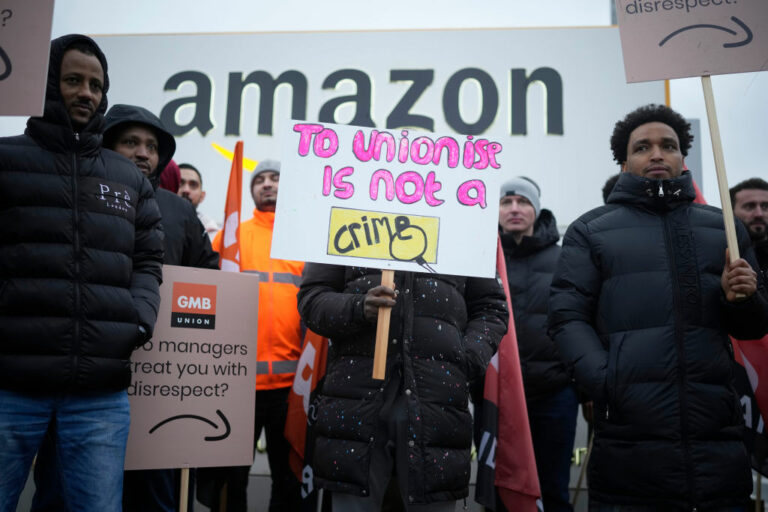Retail Gazette and Octopia host a breakfast event to discuss ecommerce growth opportunities presented to retailers by launching or selling via online marketplaces.
In the UK, ecommerce now accounts for a quarter of total retail sales, having jumped by 6% between February 2020 and February 2024.
Retailers are getting more sophisticated digitally, with many of them accelerating investment in their online offering during the pandemic and continuing to update their proposition in line with growing consumer demand ever since.
But with some of the established pure-plays, such as Asos and Boohoo battling for growth, and Made.com and Farfetch each calling in the administrators in recent times, the online retail sector is approaching something of a crossroads. The general economy is challenging, Chinese digital players Temu and Shein are investing heavily in taking market share in the UK, and consumer sentiment remains cautious, with trade body IMRG saying growth in e-commerce sales has been difficult to come by in 2024 so far.
It calls for more creative digital thinking among retailers and brands – and that was a key theme of a roundtable hosted by Retail Gazette and marketplace technology company Octopia, on 13 March.
Representatives from companies including Accessorize, BrandAlley, Frasers Group, John Lewis, Karo Healthcare, Kingfisher, Marks & Spencer, and Mars joined the debate, which was held at the salubrious Charlotte Street Hotel in London’s West End.
‘Pandora’s Box’ moment
The key talking points revolved around online and fulfilment strategy, and how retailer partnerships continue to evolve as the digital world influences how consumers want to shop for their goods.
Retailers and brands in attendance increasingly understand the power of the marketplace model and understand that it can complement a traditional e-commerce offering. One brand representative said marketplaces are where the majority of its e-commerce sales are generated, but he noted that marketplace operators are increasing their fees which is prompting the company to fine-tune its strategy online.
Retailers around the table acknowledged for true marketplace success, the service customers receive through this channel needs to be in line with their existing brand – and the idea of knowing who their audience is becomes even more important as marketplaces become more commonplace.
As more marketplaces launch – with consultancy OC&C suggesting in a recent report that the growth in this sector is being driven from vertical marketplaces focusing on specific categories – retailers are aware they need to stay laser focused on their target market.
“Know your audience, know who is loyal to you, and as more marketplaces emerge and retailers launch their own, the differentiation comes in developing your brand and understanding exactly what it is your customer wants from you,” explained one fashion retailer.
“You have to go into different spaces with different assortments – you don’t want your range as a brand to look the same on all marketplaces.”
BrandAlley, an off-price flash sales premium and luxury brand e-tailer, is in the process of launching a marketplace. It is expected to go live this spring.
Ray Clacher, chief commercial officer of BrandAlley, who attended the roundtable, said: “Building revenue for your e-commerce business can be straightforward – be the cheapest, spend the most on digital marketing, and deliver the goods next day for free.
“But that adage of ‘sales are vanity, profit is sanity’ springs to mind. Don’t be fooled by the headline grabbers quoting double and triple digit growth – show me growth in EBITDA! It has taken our business a decade to settle into the perfect model to suit the brand and the customer.”
He added: “A buy model is a good fit for some brands and consigning the goods suit others. One satisfies the consumer need for next-day delivery while the other allows for more styles to be offered, but can take longer to ship.”
Clacher continued: “By adding a marketplace solution, our buyers now have a third-way of doing business with brands who prefer to manage their own destiny with the consumer. Our team are beginning to onboard new brands, experiment with new categories, take less risk and offer more SKUs which are available on a regular basis.”
Running a marketplace, he said, should help to drive an additional 30% of revenue in the years ahead.
“Launching our new marketplace model is definitely opening up a Pandora’s Box for our business, but one which has a very positive upside for the business.”
Flexing fulfilment
Retailers in the room agreed they can’t rely on one method of fulfilment in modern commerce – there is a need for multi-model retailing and using various new avenues to get products to consumers. Being flexible here is good for ensuring continuity when disruption occurs, as has constantly been the case with retail supply chains over the last few years, but it can also save businesses money.
One retailer said: “It’s been a huge challenge recently balancing freight costs and customs duties – the supply chain has been shaken up due to the pandemic, Brexit, and geopolitical tension.
“We’ve simply had to find different places where we can fulfil from, not just relying on our traditional own warehouse model. We’ve embraced the consignment model.”
An example of the consignment model in the retail supply chain, where the retailer offers something for sale but the supplier maintains ownership of said product until a consumer buys it, is dropshipping – which is becoming increasingly popular.
A Grand View Research study from 2023 estimates the dropshipping market will be worth $1.25bn by 2030, with a CAGR of 23.4% in that time. According to the report, the growth is being driven by the rise of e-commerce globally, as well as retailers and brands’ recognising dropshipping requires less capital than other fulfilment methods.
They can reduce overheads, diversify product portfolio, and enter new territories with minimum fuss using dropshipping, according the research.
There were several nods around the table when dropshipping was mentioned as a cost-effective way of getting goods to customers around the world, and for helping reduce the cost of storing items – particularly the bulkier lines in a brand or retailers’ offering.
“When acquiring businesses, we often use a dropshipping model to relaunch them under our ownership,” said one retailer at the roundtable.
“We can test and learn quickly and gather an understanding of the types of product we might want to stock more of within our stores and online.”
Side by side
Kingfisher, which owns B&Q in the UK, has reported its overall e-commerce business has been boosted by launching online marketplaces alongside its own traditional retail websites.
According to David Gomez Cardona, group marketplace director at Kingfisher, who attended the roundtable, the move has not cannibalised the existing e-commerce operation, but instead the two strands of the digital strategy help support each other.
“As marketplaces mature, there’ll be plenty of opportunities for retailers to use them as tools for growth in e-commerce,” he explained.
“Retailers can be selective – maybe they want to use it for hard discounting, for premium, or for second-hand goods. For us, it has enabled us to grow online SKU count from around 50,000 to almost one million in a short period of time, and it has brought growth to the overall e-commerce business.”
He added: “One thing we did was to allow marketplace returns to be brought back to stores, which is unusual but ensures our customers have the same level of service however they buy from us, while bringing additional traffic to our stores network.”
Gomez Cardona continued: “B&Q’s marketplace success is a clear example of the ‘Powered by Kingfisher’ strategy in action. With the support of the group’s marketplace technology and expertise, as well as the support of specialised partners, the marketplace is now a reality for B&Q (UK), BricoDepot (Spain & Portugal), and Castorama (France).”
One of those partners is Octopia, which helps Kingfisher’s marketplaces source relevant merchant partners to sell on the platforms.
Nikki Lovell, sales manager UK & Nordics at Octopia, who took part in the roundtable, said: “Marketplaces continue to prove their worth as part of the wider e-commerce ecosystem and they are a preferred way of shopping for an increasing number of consumers.
“As brands and retailers look for ways to evolve their digital strategies, diversify their offering, increase their online exposure, and take costs out of their operations, launching their own marketplace is a viable and valid option. And as disruption in supply chains becomes par for the course, seeking out alternative methods of fulfilment such as dropshipping makes a lot of sense.”
Click here to sign up to Retail Gazette‘s free daily email newsletter


















